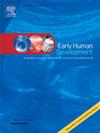胎龄对儿童早期睡眠与神经发育结果相关性的交互作用:一项从出生到24个月的纵向研究
IF 2
3区 医学
Q2 OBSTETRICS & GYNECOLOGY
引用次数: 0
摘要
目的探讨出生胎龄(GA)对出生至24月龄睡眠时间的影响及其与神经认知预后的关系。研究设计使用婴儿睡眠问卷(BISQ)收集从出生到24个月大的纵向睡眠数据。在481名参与者中,259人在24个月时使用Bayley婴幼儿发育量表(第三版)进行了神经发育评估。结果足月儿和中晚早产儿(MLPT)前3个月(3 m)的日间睡眠(DS)差异显著(6.32 h vs 6.86 h;p & lt;0.05)。3月龄后较短的DS和较长的夜间睡眠(NS)与较好的语言预后显著相关。GA和24月龄NS之间的显著相互作用表明,在GA更成熟的婴儿中,这种影响更强。从出生到24个月的DS较长,语言迟缓的风险增加29%至48%。GA还影响了6个月总睡眠(TS)对预测认知、语言和运动延迟风险的影响,表明6个月时睡眠时间较长的早产儿延迟风险更高。结论本研究揭示了纵向婴儿睡眠与神经发育结局之间的复杂关联,GA是一个调节因素。该研究强调需要进一步探索GA、早期睡眠时间和神经发育结果之间的关系。本文章由计算机程序翻译,如有差异,请以英文原文为准。
Interaction effect of gestational age on the association between sleep and neurodevelopmental outcomes in early childhood: A longitudinal study from birth to 24 months
Objective
To investigate how gestational age at birth (GA) affects the sleep durations from birth to 24 months old and its association with neurocognitive outcomes.
Study design
Longitudinal sleep data from birth to 24 months of age were collected using the Brief Infant Sleep Questionnaire (BISQ). Of the 481 participants, 259 underwent neurodevelopment assessments at 24 months using the Bayley Scales of Infant and Toddler Development, Third Edition.
Results
Daytime sleep (DS) in the first 3 months(3 m) significantly differed between term-born infants and moderate to late preterm (MLPT) infants (6.32 vs 6.86 h; p < 0.05). Shorter DS and longer nighttime sleep (NS) after 3 months of age were significantly associated with better language outcome. Significant interaction between GA and 24-month NS indicates that this effect was stronger in infants born at a more mature GA. Longer DS from birth to 24 months was associated with a 29 % to 48 % higher risk of language delay. GA also influenced the effect of 6-month total sleep (TS) on predicting the risk of cognitive, language, and motor delay, suggesting a higher risk of delay for more premature infants who sleep longer at 6 months.
Conclusion
This study revealed the complex associations between longitudinal infant sleep and neurodevelopmental outcomes, with GA serving as a moderating factor. The study highlights a need to further explore the associations between GA, early life sleep durations, and neurodevelopmental outcomes.
求助全文
通过发布文献求助,成功后即可免费获取论文全文。
去求助
来源期刊

Early human development
医学-妇产科学
CiteScore
4.40
自引率
4.00%
发文量
100
审稿时长
46 days
期刊介绍:
Established as an authoritative, highly cited voice on early human development, Early Human Development provides a unique opportunity for researchers and clinicians to bridge the communication gap between disciplines. Creating a forum for the productive exchange of ideas concerning early human growth and development, the journal publishes original research and clinical papers with particular emphasis on the continuum between fetal life and the perinatal period; aspects of postnatal growth influenced by early events; and the safeguarding of the quality of human survival.
The first comprehensive and interdisciplinary journal in this area of growing importance, Early Human Development offers pertinent contributions to the following subject areas:
Fetology; perinatology; pediatrics; growth and development; obstetrics; reproduction and fertility; epidemiology; behavioural sciences; nutrition and metabolism; teratology; neurology; brain biology; developmental psychology and screening.
 求助内容:
求助内容: 应助结果提醒方式:
应助结果提醒方式:


